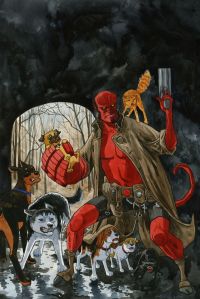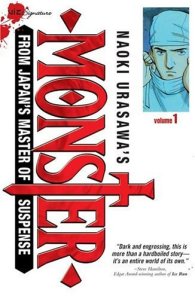Before we get into this week’s letter of the seinen alphabet, I wanted to note something that makes me happy. Yen Press has a new cover for Fumi Yoshinaga’s Not Love But Delicious Foods Make Me So Happy. It’s an improvement over the original, in my opinion.
Upcoming 10/27/2010
It’s time for another look at the week’s ComicList!
Tokyopop has a bunch of titles coming out, and my pick of that lot would be the tenth volume of Banri Hidaka’s V.B. Rose, a romantic comedy about a budding designer of accessories working in a high-end bridal shop.
Random House’s Del Rey manga imprint may be on its last legs, but it’s releasing a healthy volume of titles all the same. I was surprised by how much I enjoyed the first volume of Akimine Kamijo’s Code Breaker, so I’ll be looking for the second.
I’ve also been surprised by how much I’ve been enjoying Marvel’s Secret Avengers series, so I’ll also grab a copy of the sixth issue, which features a visit from the Master of Kung Fu.
I have no excuse for not yet sampling Beasts of Burden from Dark Horse, and perhaps the Beasts of Burden/Hellboy One-Shot isn’t the best introduction to the series, but I think I’ll grab it all the same, just because I know my comic shop will probably have a copy handy.
What looks good to you?
Birthday book: GoGo Monster
 The Comics Reporter reminds us that today is the amazingly talented Taiyo Matsumoto’s birthday. If you haven’t done so already, I recommend that you mark the occasion by reading his GoGo Monster (Viz). I reviewed the book in this Flipped column:
The Comics Reporter reminds us that today is the amazingly talented Taiyo Matsumoto’s birthday. If you haven’t done so already, I recommend that you mark the occasion by reading his GoGo Monster (Viz). I reviewed the book in this Flipped column:
“Beyond his marvelous illustrations and elliptical storytelling, the fascinating thing about Matsumoto’s work is his ability to make me root for undesirable outcomes. In Tekkonkinkreet, I found myself hoping that its protagonists would accept the futility of their fight for Treasure Town, that they would cut their losses. In GoGo Monster, I found myself siding with the forces of conformity. Admirable as Yuki’s sense of self is, and enviable as his immunity to social pressure may be, I still was persuaded by Matsumoto’s argument for a healthy, happy Yuki, even if it resulted in a less interesting, less special Yuki.”
It’s a great, great book, as is Tekkonkinkreet (Viz).
I’m still hoping that Viz will take another crack at Matsumoto’s No. 5. I think Blue Spring is still in print. Christopher (Comics212) Butcher posted a wonderfully thorough round-up of Matsumoto’s work and adaptations of it.
What’s your favorite Matsumoto title?
Random Saturday question: like a motherless child
Not too long ago, Sam Kusek was asking Twitterers to remind him of series with “daddy issues,” where the death or absence of the protagonist’s father helped drive the narrative. This got me thinking about how many manga protagonists have lost a mother. So, who are some of your favorite motherless manga heroes and heroines? I’ll reveal a couple of my favorites after the jump.
Winding paths to wanting
This week’s requests were both born of… well… getting off the subject, basically.
In this week’s installment of the seinen alphabet, someone mentioned Reiko Shimizu’s Moon Child (CMX), which… isn’t seinen, but hey, I never want to stop people from talking about comics they love. This reference came in service to a passionate endorsement of Shimizu’s Himitsu – The Top Secret, which is… also not seinen, and doesn’t start with the letter “M,” but it sounds interesting, and Moto Hagio likes it a lot. Here’s Hagio’s description:
“It’s a story about an organization that examines the brains of dead people to find out everything they’ve experienced, everything that they’ve done. Because their brains are full of all kinds of secrets. [laughs]”
The series is running in Hakusensha’s Melody magazine, which I believe straddles the shôjo-josei age line and is home to Fumi Yoshinaga’s Ôoku: The Inner Chambers (Viz), so it’s obviously a nice neighborhood with good schools. I can’t quite tell if Hakusensha has collected it in its older-skewing Jets imprint or not. [Update: Michelle Smith informs me that it is in the Jets imprint.] It’s been nominated for awards at the Japan Media Arts Festival at least twice. It’s being published in French by Tonkam.
When I was trying to figure out how I feel about March Story (Viz), I was trying to get a handle on the kind of manga published by Shogakukan’s Sunday GX. I’m not really a whole lot further down that road, because I got totally distracted by the fact that the magazine was home to a series called Rubbers 7. Because, all forensic evidence to the contrary aside, I am nine years old. Here’s the Baka-Updates summary:
“Welcome to Rubbers 7, a small Japanese convenience store with a reputation for some odd owners. Rumors of mob connections and one rather eccentric boss with a passion for Ping-pong tend to keep business low. But when a young, quiet girl is framed for shoplifting and ends up working for the store. Can her touch, with the help of her unusual coworkers, including a shy boy and a drag queen, turn the fortune of the store around?”
It ran for seven volumes, and was written and illustrated by Sukune Inugami. I like the premise, and I think there’s always room for goofy seinen created by women.
You don't know where that's been
March Story (Viz), written by Hyung Min Kim and illustrated by Kyung-il Yang, does not lead with its best foot, in my opinion. It’s nominally in the “comeuppance theatre” category of storytelling in that it’s largely episodic and features terrible but avoidable things happening to guest stars with a protagonist swooping in to try and minimize the damage. But unlike my favorite examples of comeuppance theatre, bad things don’t happen to these people because they themselves are bad, but because they’re kind of dumb. I’m going to put the rest of this entry behind a jump, because it’s less of a review than a spoiler-filled, inexplicably obsessive discussion.
In this comic, which originally ran in Shogakukan’s Sunday GX, beautiful objects can leave their admirers vulnerable to possession by evil spirits called “Ill.” In the first chapter, a young girl is explicitly warned not to touch unknown objects. She’s told what might happen, and she seems to grasp the possible consequences. Then she sees something pretty and sparkly lying around, and caution goes out the window with predictable results. March, our titular hero, tries to salvage the situation, but it’s hard to care all that much.
In the second chapter, a character has apparently reached out to March for assistance only to immediately and willfully prevent March from intervening in any constructive way. The reason for this is fairly skeletal, insufficient in any persuasive essentials since the supplicant is rendered in shorthand, and it’s hard not to suspect that this beautiful, European-esque landscape is filled with idiots and that Darwinian principles should be allowed to run their course, you know?
In the third chapter, March is sought out not by a victim of the objects that can wreak such havoc but by a dealer in curios who is apparently kind of a sadist. He knows he’s releasing ill-infected objects among his clientele, but he’s more interested in seeing how things will play out than in preventing them from happening in the first place. It’s novel, since the Ill’s victims in this case have no way of avoiding their misfortunes. But still, someone who knows better fails to act in a responsible, even sensible way.
It’s weird. It feels like the creators are absolving you from caring about what happens to their characters, though perhaps they just don’t have a particularly firm grasp on the difference between things that are tragic and things that are just kind of stupid. If a tree falls in the forest, should you feel badly for the person who runs to be under it when it crashes to the ground as people shout to warn them what the result will be?
The thing is, the fourth chapter is great. It’s creepy and tragic and roughly one thousand times more interesting than the chapters that come before it, and my regard should be evident in the fact that I’m reluctant to spoil anything that actually happens in the story. It makes you wonder how the earlier chapters would have read if you’d known March’s back story before you’d slogged through a bunch of pages of bad things happening to stupid people because they’re stupid.
I’m reminded of the experience of reading the first couple of volumes of Natsuki Takaya’s Fruits Basket (Tokyopop), which were undeniably generic. The events of those first two volumes, when viewed through the prism of later events and revelations, become essential only in retrospect, but the power of those later moments would not have been possible without slogging through the early bland bits. For people who will never be persuaded by a comparison to Fruits Basket, I’d throw in the first issue of Kurt Busiek’s Thunderbolts (Marvel), which seemed like a totally bland super-team comic until the last-page reveal in the first issue.
Am I saying that March Story is going to reach Fruits Basket or Thunderbolts heights? I have no idea, and the Fruits Basket-Thunderbolts analogy isn’t really very apt, because the power of the fourth chapter is entirely independent of anything that happened before. The earlier chapters suggest March as a master of ceremonies rather than a protagonist. One could successfully argue that the whole reading experience might have been more enticing if the first three chapters had been pitched entirely and the readers had been thrust into the middle of things, wondering about the tragic figure who would become the hero as opposed to the host who’s in every chapter.
But, unearned as my interest is by 75% of the first volume’s content, it does indeed have my interest for at least another volume. The book is beautifully drawn throughout, and while the creators only took one of four opportunities to indicate that they have anything interesting in mind for the series, they made more than any reasonable reader could have expected of that one opportunity.
Again… weird. Has anyone else read this? I’ve made a point of not reading any reviews, but I’ll happily add links now that I’ve rambled on at unnecessary length.
Link of the day
My biggest disappointment in not being able to attend this year’s New York Comic-Con/Anime Festival came from the fact that I wouldn’t be able to attend the panel, “Gay for You? Yuri and Yaoi for GLBTQ Readers.” Thankfully, Deb (About.Com) Aoki has posted a transcript of the panel along with a list of recommended yaoi and yuri titles for that audience.
And just because I can’t read one of these lists without adding at least two cents worth of unsolicited input, I will suggest the addition of Only the Ring Finger Knows (DMP), written by Satoru Kannagi and illustrated by Hotaru Odagiri, especially for younger readers.
The Seinen Alphabet: M
“M” is for…
Well, it’s for lots of stuff, so I won’t even try and be comprehensive. I’ll just hit the highlights.
Technically, this could fall under “N,” as Viz insists on putting “Naoki Urasawa” in front of all of that creator’s titles, but I’ll just stick with plain-old Monster in this case. It’s about a brilliant surgeon who unknowingly saves the life of a deranged killer. Oops!
On a much lighter front, we have Rumiko Takahashi’s Maison Ikkoku (Viz). It follows the start-and-stop romance of a somewhat aimless young man and his widowed landlady. They also have crazy neighbors who are pretty funny.
On an arguably much more horrible front, we have the often fervently disliked Maria Holic (Tokyopop), written and illustrated by Minari Endou and originally serialized in Media Factory’s Monthly Comic Alive. It’s not all wrongly accused neurosurgeons and romantic comedy, kids.
On an interesting but commercially shaky front, we have Me and the Devil Blues: The Unreal Life of Robert Johnson (Del Rey), written and illustrated by Akira Hiramoto, who added some supernatural elements to the life of the legendary blues musician.
Sticking with Del Rey, we have Yuki Urushibara’s excellent Mushishi, which was the topic of a Manga Moveable Feast.
Also from Del Rey and also focused on the microscopic is Moyasimon: Tales of Agriculture, written and illustrated by Masayuki Ishikawa, which is in limbo since the Kodansha shake-up.
Viz just launched March Story, written by Hyung Min Kim and illustrated by Kyung-il Yang, and originally published in Shogakukan’s Sunday GX magazine.
One could theoretically do the Tezuka Alphabet, you know? In the seinen category, one of my favorites of his works is the deeply crazy MW (Vertical).
On the creator front, we’d certainly have to start with Taiyo Matsumoto, known best here for his brilliant Tekkonkinkreet and GoGo Monster and perhaps less so for his out-of-print Blue Spring and No. 5, all from Viz.
Viz has also published Motoro Mase’s Ikigami: The Ultimate Limit.
Lots of people have loved the work of Kaoru Mori, including Emma and Shirley from DC’s lamented CMX imprint. But we can look forward to her Otoyomegatari from Yen Press.
Minetaro Mochizuki’s Dragon Head (Tokyopop) enjoyed critical if not commercial success when it was published here.
Few creators are capable of the kind of tightly-controlled crazy delivered regularly by the brilliant Junko Mizuno, most recently of Little Fluffy Gigolo Pelu (Last Gasp) fame.
Some of my favorite comics have come from Kodansha’s Morning magazines.
And way back in the day, Tokyopop published a little magazine known originally as MixxZine, which featured seinen titles like Parasyte and Ice Blade.
I wouldn’t even know where to begin with the unlicensed seinen titles that start with “M,” so please feel free to contribute your suggestions in the comments. And of course, I’m curious as to anything that starts with “M” in your seinen alphabet!
Updated:
I don’t know how I forgot MPD Psycho (Dark Horse), written by Eiji Otsuka and illustrated by Sho-u Tajima. It could be that the series is a little gross for my taste and I prefer Otsuka’s Kurosagi Corpse Delivery Service, which he creates with Housui Yamazaki, who created Mail, also from Dark Horse. I like Mail a lot, but I left it off this list because I thought it was originally published in a shônen magazine (Kadokawa’s Shônen Ace). Can I have a ruling?
Upcoming 10/20/2010
Goodness, but it’s a dense ComicList this week!
Dark Horse continues to work its way through some of CLAMP’s most-loved back catalog. This week, it’s the first omnibus volume of Cardcaptor Sakura, originally published in English by Tokyopop and with an associated, legendarily butchered anime dub, if I remember correctly.
I liked the first volume of Chigusa Kawwai’s Alice the 101st (DMP) quite a bit. It’s about kids at a music school in Epcot Europe, and the second volume arrives Wednesday.
I’m also very fond of Konami Kanata’s Chi’s Sweet Home (Vertical), a slice-of-life tale about an orphaned kitten settling in with her new family. The third volume is due, and I’m working on a review of the series for later this week.
March Story (Viz), written by Hyung Min Kim and illustrated by Kyung-il Yang, is more interesting to me conceptually than it is for its individual merits. It originally ran in Shogakukan’s Sunday GX, and it’s by Korean creators, so that’s kind of unusual. Other than that, it’s very well-drawn but kind of average comeuppance theatre. It’s a big week for Viz’s Signature imprint with new volumes of 20th Century Boys, Kingyo Used Books, and Vagabond.
Yen Press is releasing a lot of product this week, but my clear favorite is the fourth volume of Svetlana Chmakova’s Nightschool, a complex, polished supernatural adventure about a school for mystical types.
What looks good to you?
From the stack: Grand Guignol Orchestra
 “I like an anything goes approach,” Kaori Yuki assets in one of her creator’s notes in the first volume of Grand Guignol Orchestra (Viz.) This statement is about as close as Yuki comes to understatement anywhere in this paperback. And that’s fine.
“I like an anything goes approach,” Kaori Yuki assets in one of her creator’s notes in the first volume of Grand Guignol Orchestra (Viz.) This statement is about as close as Yuki comes to understatement anywhere in this paperback. And that’s fine.
Given that Grand Guignol Orchestra is a sort-of period piece about a group of musicians who fight zombies, one should only expect so much restraint, and given that it’s by Yuki, one would be lucky to find any restraint at all. It’s not one of her defining characteristics, and I can’t imagine that it would really be one of her strengths.
I say this as someone who hasn’t read a ton of Yuki’s work. I found the first couple of her Godchild to be visually impressive but so clumsily translated and adapted that I couldn’t bear to read any more. Camellia Neigh’s work on Grand Guignol Orchestra is much more fluid and lucid, though still tinged with that special brand of Yuki madness. Her stories will probably only ever be mostly lucid, I suspect, because she’s very invested in atmosphere and, as she confesses, “anything goes.”
There’s an undeniable charm in the idea of musicians being the only thing that can destroy zombies (zombies that look like dolls, no less). It’s sort of like Mars Attacks!, but much more sincere, and the music isn’t just a gag at the end. The orchestra itself is more of a combo, starting with three members and adding a fourth by the end of their first adventure. Membership seems limited to the androgynous and the thuggish, though only half the regular cast is properly developed in this first volume.
Yuki is fond of twists, and things are seldom entirely what they seem. She has mixed success with the reveals; sometimes they’ve got a creepy jolt, sometimes they’re just mildly confusing. But it’s nice to see some narrative punch mixed in with the faux-European aesthetic (which you cannot deny is lovingly, sometimes ravishingly rendered) and the sly-cool cast of characters.
As is usually the case with Yuki’s work (in my admittedly limited experience), the real successes come in the form of smartly conceptualized horror. In this case, it’s the guignols themselves, disease-stricken innocents who’ve become a kind of cracked-porcelain zombie. Yuki adds a layer of sweetness and powder to the decay, which always makes it more unsettling, at least in my opinion.
But while Yuki’s work always has its points of appeal, I’m never entirely sold. She strikes me as having the potential to become a more commercial Junko Mizuno if she could just strike that balance between creative focus and intellectual abandon and emotional shamelessness. Yuki seems to be always on the verge and never quite there, at least yet. But I do love to see a reliably popular creator in any comics category who also seems at least a little bit deranged.
(This review is based on a complimentary copy provided by the publisher. Grand Guignol Orchestra was originally serialized in Hakusensha’s Bessatsu Hana to Yume.)






















